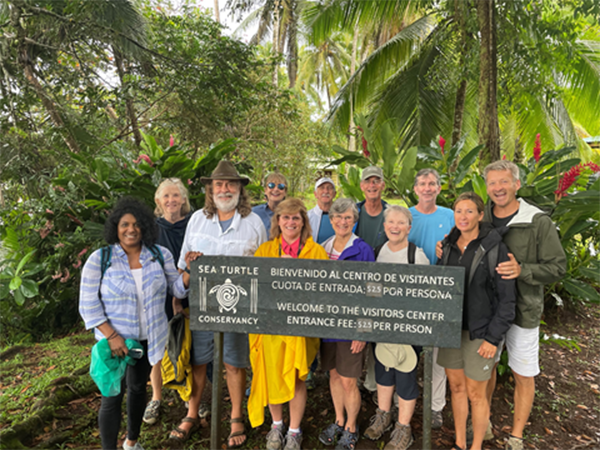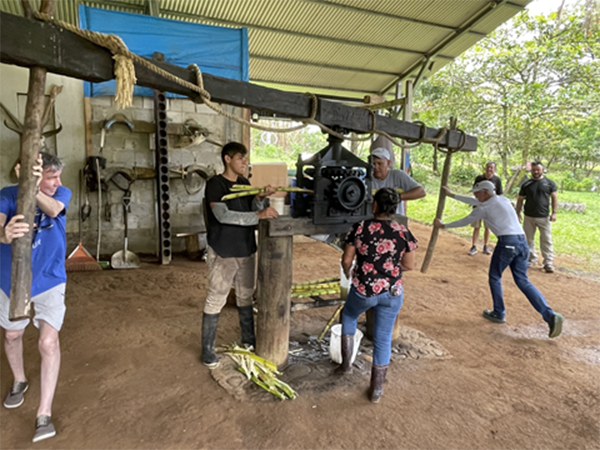The Holbrook Explorer

Travel Flowing Again for Tennessee Aquarium
Travel Flowing Again for Tennessee Aquarium
Back from the Field: Q&A with Melanie King, Director of Development
Situated on the Tennessee River in downtown Chattanooga, the Tennessee Aquarium sits in a biodiversity hotspot. That’s in part why the aquarium decided to sponsor a member travel program to Costa Rica, a “sister hotspot,” to compare and contrast the flora and fauna. The pandemic delayed their plans, but their group recently returned with an amazing experience captured in a photo journal. We caught up with Melanie to get an inside view on their mission and Costa Rica trip.

Q: Tell us about what you do at the aquarium and how travel fits into your mission?
Melanie: As Director of Development, I oversee the fundraising department at the aquarium. Last year I took over the travel program, which was a challenging time to take it over, but we believe that it's an important part of getting to know our members and our donors. Travel connects us and exposes us to different ecosystems, species and communities around the world, not just here in Tennessee. Part of our mission is to educate people, and travel does that by exposing us to other places that help us learn and gain perspectives.

Q: How is the aquarium operating at this time? How have you been recovering?
Melanie: We were closed for 96 days in 2020 so the recovery has been slow, but it has been steady. We put a lot of protocols in place, such as timed tickets, signage to keep people safe, and mask mandates or mask-only days, and a robust cleaning regimen. In the exhibits, our attendance and participation has been really great and people have felt safe, so our recovery is underway and things are pretty positive for us right now.

Q: How do you go about deciding on different destinations for the travel program?
Melanie: I think it's important for us that there be a strong conservation message with an ecotourism feel to it. I don't think we would do a trip that doesn't connect directly with our mission to connect people with nature. And also water, obviously, is a huge part of what we do, so where we can find connections with water and the importance of water – that would be a driver for selecting our trips. We want people to understand that the rivers and streams ultimately end up in the oceans. We live by a big river here but it's all connected, and when you travel you get to see that.

Q: Why was Costa Rica a good destination to connect with your mission?
Melanie: Costa Rica is all about conservation and holds so much biodiversity in a small country. For us it is a good fit because the southeast of the United States is a huge biodiversity hotspot too. When I hear the words Costa Rica, I think of all the different things that you can see there that you won't be able to see anywhere else. It has a good reputation for tourist safety – even before the pandemic. I think a lot of people feel confident to travel there and that they're going to see a well-preserved space where people take care of the precious resources they have.

Q: Regarding safety, what was it like to travel in Costa Rica at this time?
Melanie: We were all pleasantly surprised about how seamless it all went. For most of us it was the first time being on a plane since Covid hit. When we got to Costa Rica, we felt safe with the many protocols in place, perhaps even more than here. There was lots of mask-wearing, lots of opportunities for hand-washing, everywhere we went. We also knew that while we were vaccinated, a lot of the people in Costa Rica have not had a chance to be vaccinated yet, so we also wanted to be careful and mindful of their situation as visitors to their country. Costa Ricans were so grateful to see us; we were thanked many, many times. So I felt extremely safe in Costa Rica, during that time, absolutely.

Q: Can you describe the various places that you visited in Costa Rica?
Melanie: We started in Tortuguero – which was just an amazing opportunity right from the very beginning – observing sea turtles and helping with the conservation team who work there year-round. As we watched these turtles come ashore or depart, or lay eggs, there were tears in our eyes, men included! It was just a really special thing to witness, lying on our stomachs and counting eggs as they dropped into the nests. I love that we're not allowed to take our cameras because it's something so special that you couldn't capture it. It's just an absolutely magical thing that happens.


Next we traveled to Sarapiquí for an immersive rainforest experience. Selva Verde was just a beautiful space to be in and an amazing facility in a jungle with trails that we could walk around and see things on our own. Through the activities, we got the concept of just how many things there are to look at in Costa Rica. You just can't keep up with the number of birds, the number of plants, the number of insects, even cockroaches were interesting.

And then we ended up in the Arenal area and learned about the volcanoes, a nice experience and some wonderful hikes around there as well. I think that was a really nice way to end the trip.

Q: How about the travelers themselves? What did they take away from this experience, and what was the overall feedback?
Melanie: The overall feedback was out of this world. We would end most days just gushing about what an incredible day it had been. Plus, the local guide and the great cohesiveness of the group added a lot to the enjoyment. People were really, really happy with the trip. They walked away from that saying, “This is why people talk about Costa Rica and have it on the bucket list.” I think it lived up to that.

Q: What would you say to other nature organizations and to their members about traveling now? Is it something that anyone should consider?
Melanie: Yes. I think you do your research and you work with qualified providers that you trust. And I think you step out there and you do it. There's lots of protocols in place and these countries want to see us and honestly, NEED to see us. I think it's important to start to travel again and to support these places that we go to.

Q: Is there anything else you would like to add?
Melanie: Some of the other things we saw like the first sloth sighting was huge – actually any time we saw sloths was a big event. But there were other things like cutter ants that we were fascinated with and watching a flock of macaws fly free over a road was also breathtaking. You walk away learning about something that you think was fairly insignificant and realizing how important it is to the ecosystem. That's what Costa Rica is about – understanding how much is there and how it's all connected.

Melanie King is Director of Development at the Tennessee Aquarium and a passionate advocate for animals and conservation – particularly lemurs. Born in Northern Ireland, she has traveled throughout Ireland, Scotland, and Wales with visits to the north of France and Spain. She has also spent many vacations in Canada, including British Columbia, Quebec City, and Newfoundland. Further afield, she attended a wedding in the Indian state of Rajasthan, has taken a cruise of the Greek Isles, and enjoyed a full crossing of the Panama Canal. Her favorite place to travel is still Northern Ireland. Melanie took a small group to explore Costa Rica and learn together about how scientists are working to protect the flora and fauna of this biologically rich and ecologically important region.
Photos courtesy of Melanie King & Tennessee Aquarium travelers

